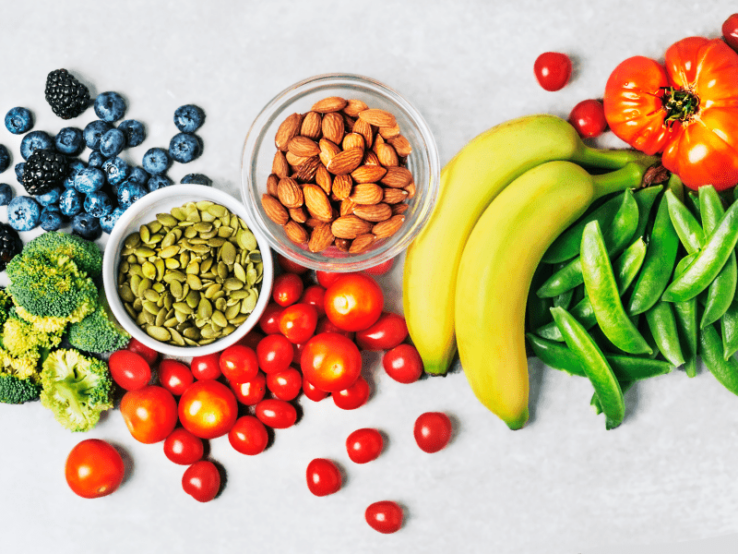Are you contemplating the benefits of switching to a plant-based diet to improve health, feel better, and maybe even reduce your environmental impact?
Eliminating dairy products and meat from your diet is a wise choice, as it brings forth numerous health benefits. Most people struggle to replace the savoriness of meat and the joy they experience from eating cheese and dairy-based products. But once you find flavorful meat substitutes like tempeh and tofu, there’s simply no looking back!
More and more people worldwide are switching to vegan diets, given the exponential rise of acute and chronic illnesses. Diets rich in carbs, saturated fats, and trans fats increase the risk factors for cardiovascular complications, cancer, and type 2 diabetes.
Replacing animal-derived products with plant-based ingredients can improve life quality by supporting higher energy levels and increased nutrient consumption. Read on to explore the benefits of switching to a vegan diet.
Flavorful, Nutrient-Dense Alternatives to Unhealthy Foods

Source: m.timesofindia.com
Let’s begin by busting a popular myth: switching to a vegan diet will not deprive you of the delicious taste of your favorite foods. In fact, there’s a guilt-free vegan alternative for every dessert and savory treat. For instance, you can fix yourself a nutritious burger by swapping meat-based patties with vegan alternatives.
Tofu is an excellent alternative to meat, and the texture makes it perfect for baking, deep-frying, grilling, and stir-fry recipes. Black beans and chickpeas are another popular alternative to prepare delicious smash burgers packed with herbs and spices. You can satisfy your sweet tooth with innumerable recipes for fudgy vegan brownies prepared with plant-based alternatives, not with dairy ingredients or eggs.
You can whip up a decadent brownie batter with 100% natural cocoa, nut-based milk, plain flour, and vegan dark chocolate. Adding creamy avocados or mashed chickpeas will give your brownies an extra fudgy, gooey, and moist consistency. Switching to almond flour and coconut milk will elevate the flavor profile with a nutty tinge.
Concentrations of Essential Nutrients
The body thrives on a vegan diet and its rich concentration of essential nutrients, including antioxidants, phytonutrients, minerals, and vitamins. In contrast, a typical Western diet packed with dairy, meats, and fast food staples causes bodily organs to deteriorate with compromised immunity.
Switching to a plant-based diet demands eliminating all animal-derived products, including dairy, eggs, and meat. Once you eliminate these ingredients, you’ll explore an array of wholesome foods you’ve never consumed. These include fruits, beans, nuts, seeds, whole grains, peas, and seaweed.
Research reveals that vegan diets provide rich concentrations of plant-based compounds, antioxidants, protein, and fiber. They are considerably richer in vitamins A, C, and E, with high mineral densities, particularly folate, magnesium, and potassium. However, it is important to prioritize research and meal planning to enjoy these nutrient densities.
Healthy Weight Management

Source: health.harvard.edu
Switching to a vegan diet can help support healthy weight management if you’re struggling to lose excess weight and stay fit. Instead of depriving yourself by excluding hearty treats, embracing plant-based alternatives is a more practical weight loss approach. Naturally, portion control is of the utmost significance, as consuming large portions of vegan meals won’t help much.
Multiple studies reveal that vegans have significantly lower body mass and thinner waistlines than non-vegans. Vegan diets supply rich concentrations of fiber, protein, and vitamins that will satiate your appetite to curb untimely cravings. A low-fat vegan diet rich in fiber and protein offers remarkable weight loss benefits than a standard low-fat diet.
Reduced Health Risk Factors

Source: heart.org
People diagnosed with type 2 diabetes are strongly advised to switch to vegan diets to reduce their blood sugar levels. That’s not all. Vegan diets fight diabetic symptoms by improving kidney function and promoting higher insulin sensitivity.
Vegan meal plans are also effective at normalizing high blood pressure levels, making them particularly beneficial for patients with hypertension. By addressing hypertension, a plant-based diet reduces the risk factors of multiple diseases, including type diabetes and cardiovascular complications. One study investigated these claims by reviewing data from 39 studies.
The findings revealed that vegans have considerably lower blood pressure levels and a significantly lower risk for heart disease. People diagnosed with heart disease or those who have suffered a stroke can transform their physical well-being with a vegan diet. Meat eaters with alarming cardiovascular risk factors can eliminate risk factors considerably.
Final Thoughts
Adjusting to a plant-based diet after a lifetime of meat consumption and dairy-filled delights can prove overwhelmingly heart. But the struggle becomes easier once you examine the health benefits and commit yourself to positive change. We suggest making small changes to avoid overwhelming yourself and denying yourself the foods you crave.
For instance, switch to a plant-based breakfast and dinner, consuming meats only during lunch with ample time for digestion. Starting small will help your taste buds get accustomed to the plant-based flavor palette. Exploring flavorful recipes packed with herbs and spices will make the transition fun and exciting.




